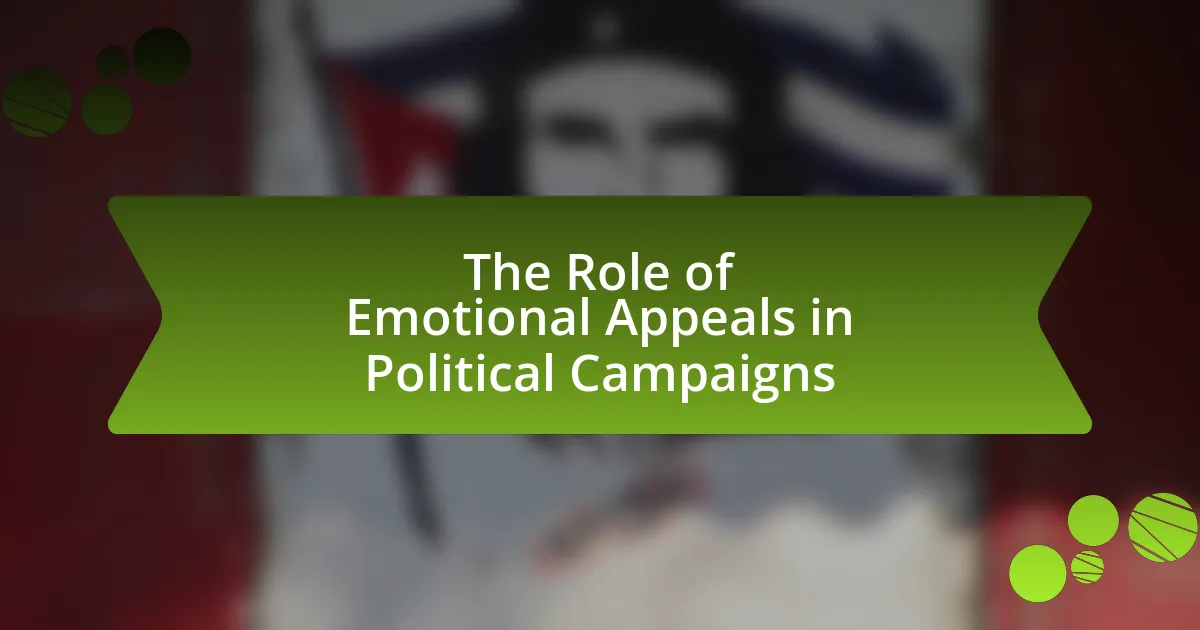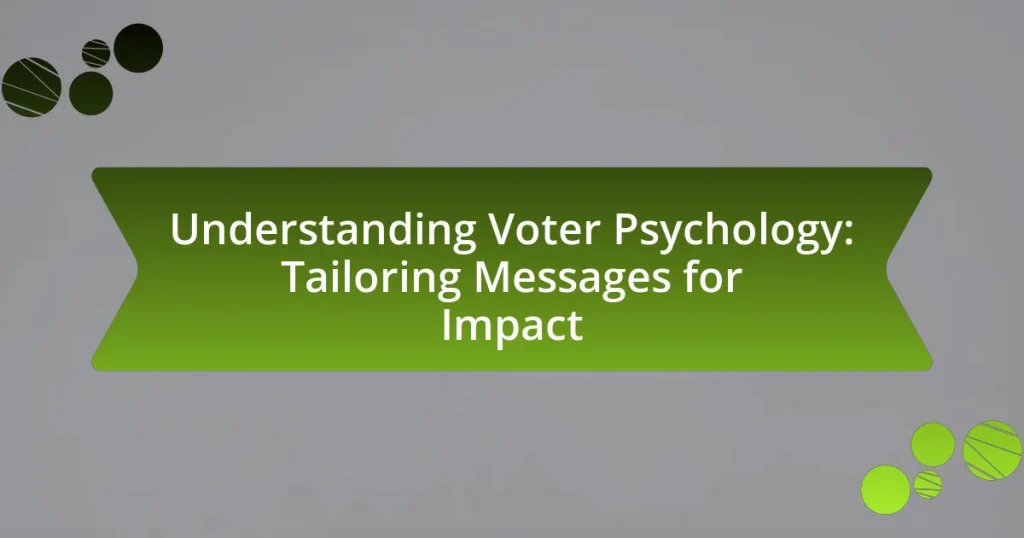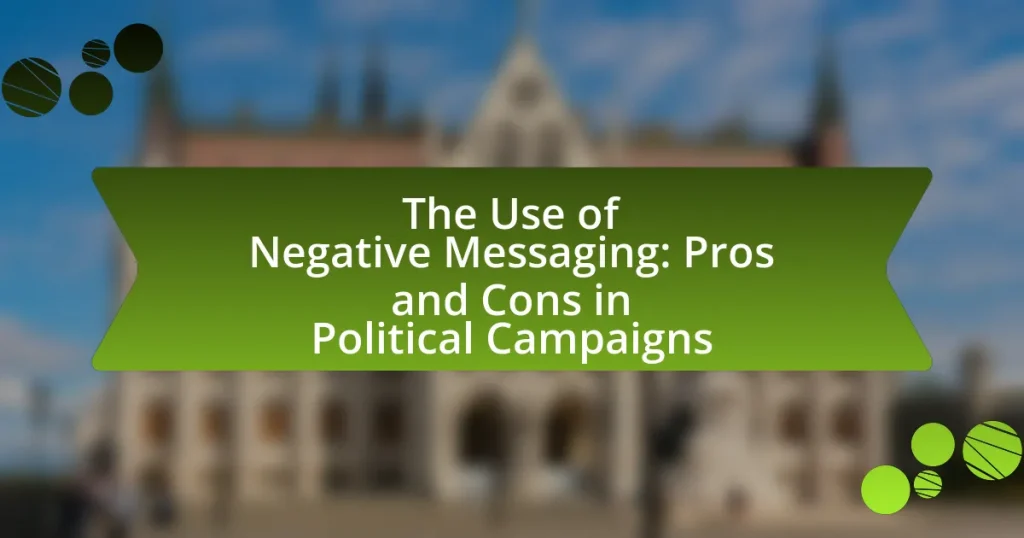The article examines the role of emotional appeals in political campaigns, highlighting how these strategies evoke strong feelings to influence voter behavior and decision-making. It discusses the psychological mechanisms behind emotional appeals, such as affective reasoning and social identity, and contrasts them with rational arguments. The article also explores various types of emotional appeals, including fear, hope, anger, and empathy, and their effectiveness in mobilizing voters. Additionally, it addresses the importance of cultural context and current events in shaping emotional messaging, as well as best practices and ethical considerations for political campaigns utilizing emotional appeals.
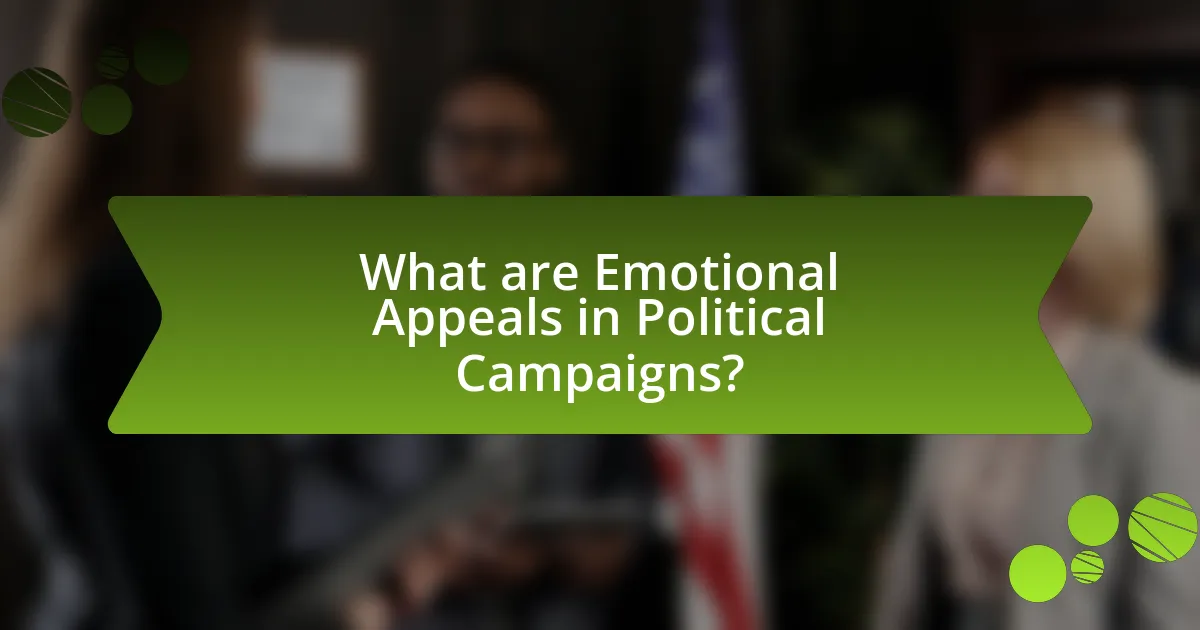
What are Emotional Appeals in Political Campaigns?
Emotional appeals in political campaigns are strategies that evoke strong feelings to influence voters’ attitudes and behaviors. These appeals often leverage emotions such as fear, hope, anger, or empathy to create a connection between the candidate and the electorate. For instance, research by the American Psychological Association indicates that emotional messaging can significantly enhance voter engagement and decision-making, as emotions often drive human behavior more than rational arguments.
How do emotional appeals influence voter behavior?
Emotional appeals significantly influence voter behavior by shaping perceptions and motivating decisions. Research indicates that voters are more likely to engage with candidates who evoke strong emotional responses, such as fear, hope, or anger. For instance, a study published in the journal “Political Psychology” by Brader (2006) found that emotionally charged advertisements increased voter turnout by 10% compared to neutral ads. This demonstrates that emotional messaging can effectively mobilize voters and sway their preferences, highlighting the critical role emotions play in political campaigns.
What psychological mechanisms are involved in emotional appeals?
Emotional appeals engage psychological mechanisms such as affective reasoning, social identity, and cognitive dissonance. Affective reasoning refers to the way emotions influence decision-making, leading individuals to prioritize feelings over factual information. Social identity theory posits that individuals align their beliefs and behaviors with groups they identify with, making emotional appeals more persuasive when they resonate with group values. Cognitive dissonance occurs when individuals experience discomfort from conflicting beliefs or behaviors, prompting them to change their attitudes to reduce this discomfort. These mechanisms are supported by research indicating that emotional content in political messaging significantly impacts voter behavior and decision-making processes. For instance, studies show that emotionally charged messages can increase voter turnout and engagement, demonstrating the effectiveness of these psychological mechanisms in political campaigns.
How do emotional appeals differ from rational arguments in campaigns?
Emotional appeals in campaigns differ from rational arguments primarily in their focus on feelings rather than logic. Emotional appeals aim to evoke strong feelings such as fear, hope, or empathy to influence voter behavior, while rational arguments rely on facts, statistics, and logical reasoning to persuade the audience. For instance, a campaign might use a personal story to create a connection with voters, tapping into their emotions, whereas a rational argument would present data on economic performance to support a candidate’s policies. Research indicates that emotional messaging can be more effective in swaying undecided voters, as it engages them on a personal level, making the message more memorable and impactful.
Why are emotional appeals important in political messaging?
Emotional appeals are important in political messaging because they effectively engage voters’ feelings, leading to stronger connections with candidates and their platforms. Research indicates that emotions significantly influence decision-making; for instance, a study published in the journal “Political Psychology” found that emotionally charged messages can increase voter turnout by creating a sense of urgency and personal relevance. By tapping into emotions such as fear, hope, or anger, political messages can motivate individuals to act, thereby enhancing the overall impact of a campaign.
What role do emotions play in decision-making during elections?
Emotions significantly influence decision-making during elections by shaping voter perceptions and preferences. Emotional responses, such as fear, hope, and anger, can drive individuals to support specific candidates or policies, often overriding rational analysis. Research indicates that emotionally charged messages are more likely to be remembered and can create a stronger connection between voters and candidates. For instance, a study published in the journal “Political Psychology” by Brader (2006) found that emotional appeals in campaign advertisements increased voter engagement and turnout. This demonstrates that emotions are not merely background factors but central to how voters make choices in electoral contexts.
How can emotional appeals enhance candidate relatability?
Emotional appeals enhance candidate relatability by fostering a connection between the candidate and the electorate through shared feelings and experiences. When candidates express emotions such as empathy, compassion, or resilience, they resonate with voters on a personal level, making them appear more human and approachable. Research indicates that voters are more likely to support candidates who evoke positive emotions, as these feelings can lead to increased trust and identification with the candidate. For instance, a study published in the Journal of Politics found that candidates who effectively utilized emotional storytelling in their campaigns saw a significant increase in voter engagement and support, demonstrating the power of emotional appeals in enhancing relatability.
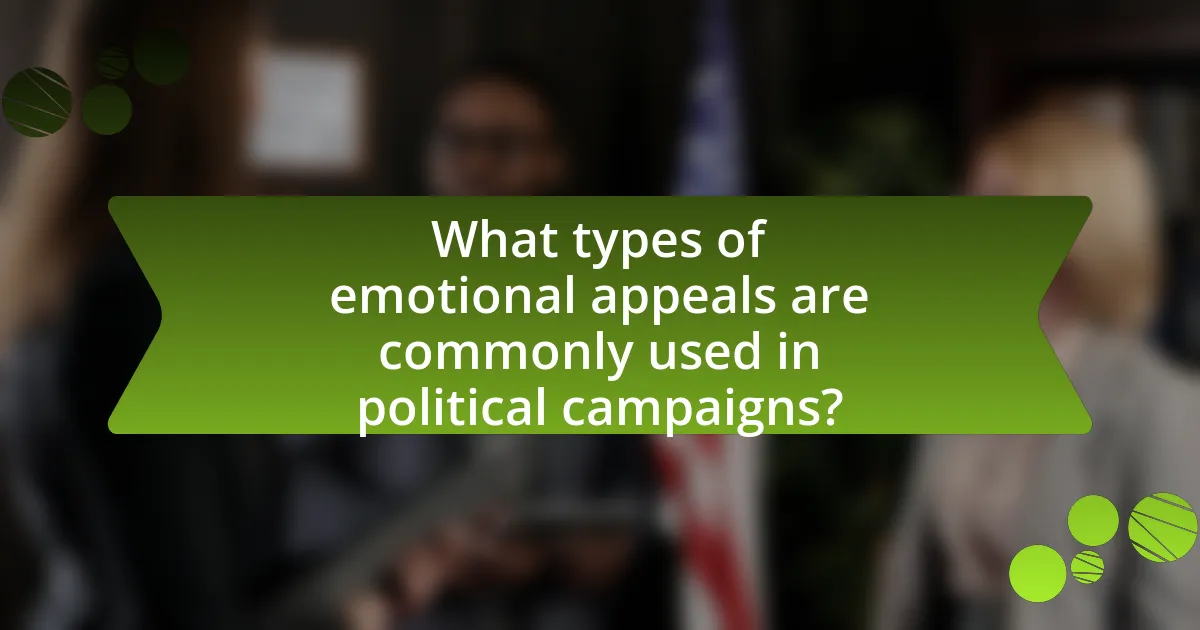
What types of emotional appeals are commonly used in political campaigns?
Political campaigns commonly use emotional appeals such as fear, hope, anger, and empathy to influence voter behavior. Fear appeals often highlight potential threats or negative consequences of opposing candidates or policies, aiming to provoke anxiety and motivate action. Hope appeals focus on positive visions for the future, encouraging voters to aspire for change and improvement. Anger appeals tap into feelings of frustration or injustice, galvanizing support against perceived wrongs. Empathy appeals connect voters emotionally to specific individuals or groups, fostering a sense of shared experience and compassion. These emotional strategies are effective because they resonate deeply with voters, often leading to increased engagement and support for candidates.
How do fear-based appeals affect voter turnout?
Fear-based appeals significantly increase voter turnout by motivating individuals to act in response to perceived threats. Research indicates that when voters are exposed to fear-inducing messages, they often feel a heightened sense of urgency, prompting them to participate in elections to mitigate the risks presented. For instance, a study published in the journal “Political Psychology” by K. A. McGregor and colleagues found that fear appeals can lead to increased political engagement, as individuals are more likely to vote when they believe their values or safety are at stake. This demonstrates that fear-based messaging can effectively mobilize voters by emphasizing the consequences of inaction.
What examples illustrate the effectiveness of fear in campaigns?
Fear has been effectively utilized in campaigns, notably in the “Daisy” ad by Lyndon B. Johnson in 1964, which depicted a young girl in a nuclear explosion scenario to evoke fear of nuclear war. This ad significantly influenced public perception and contributed to Johnson’s victory. Another example is the “Willie Horton” ad used by George H.W. Bush in 1988, which highlighted the dangers of crime associated with a convicted felon, effectively instilling fear about crime rates and influencing voter behavior. These instances demonstrate that fear can be a powerful motivator in shaping voter attitudes and decisions.
How can fear appeals backfire in political messaging?
Fear appeals can backfire in political messaging by causing audience resistance and disengagement. When voters perceive fear tactics as manipulative or exaggerated, they may react negatively, leading to a decrease in support for the candidate or message. Research indicates that fear-based messages can trigger defensive responses, such as denial or counter-arguing, which undermine the intended persuasive effect. For example, a study published in the Journal of Communication found that overly fearful messages can lead to increased skepticism and reduced trust in the source, ultimately harming the credibility of the political campaign.
What role does hope play in political campaigns?
Hope serves as a crucial emotional appeal in political campaigns, motivating voters to engage and support candidates. It fosters a sense of optimism about the future, encouraging individuals to believe in the possibility of positive change. Historical examples, such as Barack Obama’s 2008 campaign, illustrate how hope-driven messaging can galvanize diverse voter demographics, leading to increased turnout and support. Research indicates that campaigns emphasizing hope can enhance voter enthusiasm and commitment, ultimately influencing electoral outcomes.
How do hopeful messages inspire voter engagement?
Hopeful messages inspire voter engagement by creating a sense of optimism and possibility among the electorate. When political campaigns convey positive visions for the future, they resonate emotionally with voters, motivating them to participate in the electoral process. Research indicates that messages emphasizing hope can increase voter turnout; for instance, a study published in the Journal of Politics found that optimistic campaign messaging significantly boosts voter enthusiasm and mobilization efforts. This emotional appeal not only fosters a connection between candidates and constituents but also encourages individuals to believe that their participation can lead to meaningful change.
What are the risks of over-promising in hopeful appeals?
Over-promising in hopeful appeals can lead to significant risks, including loss of credibility and voter disillusionment. When political campaigns make unrealistic promises, they set expectations that are often unattainable, resulting in disappointment among constituents. This disappointment can erode trust in the candidate and the political system, as evidenced by studies showing that broken promises can lead to decreased voter turnout in subsequent elections. Additionally, over-promising can create a backlash, where voters feel manipulated, leading to increased skepticism towards future hopeful messages.
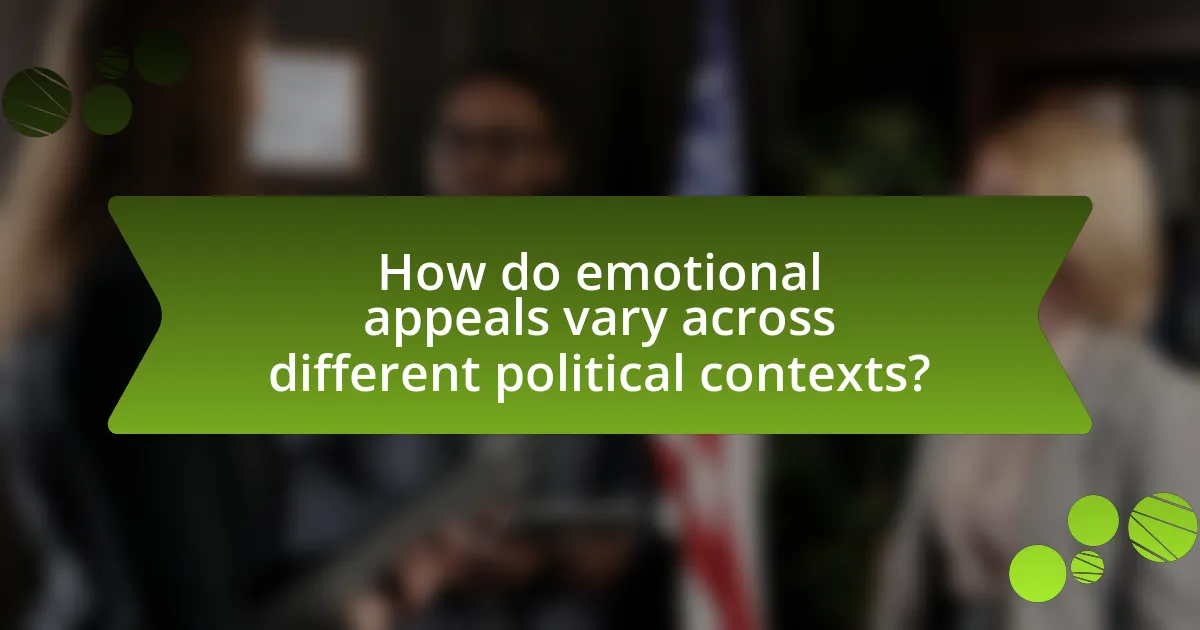
How do emotional appeals vary across different political contexts?
Emotional appeals vary significantly across different political contexts, as they are tailored to resonate with the specific values, beliefs, and concerns of the target audience. For instance, in democratic contexts, emotional appeals often focus on themes of hope, change, and collective identity, as seen in Barack Obama’s 2008 campaign, which utilized messages of unity and optimism to engage voters. Conversely, in authoritarian regimes, emotional appeals may leverage fear and nationalism to consolidate power, exemplified by leaders who invoke threats to national security to justify their actions and rally support. Research indicates that emotional appeals are more effective when aligned with the cultural and political climate; for example, a study by Brader (2006) found that emotional messages can significantly influence voter turnout and preferences, depending on the prevailing political environment.
What factors influence the effectiveness of emotional appeals in various cultures?
The effectiveness of emotional appeals in various cultures is influenced by cultural values, social norms, and communication styles. Cultural values dictate what emotions are prioritized; for instance, collectivist cultures may respond better to appeals emphasizing community and harmony, while individualistic cultures may resonate more with personal achievement and autonomy. Social norms shape the acceptability of expressing emotions; cultures that encourage emotional expression may find emotional appeals more effective than those that discourage it. Additionally, communication styles, such as direct versus indirect communication, affect how emotional messages are received and interpreted. Research by Matsumoto and Hwang (2013) highlights that emotional expressions are culturally bound, impacting their persuasive power in political contexts.
How do cultural values shape emotional messaging in campaigns?
Cultural values significantly shape emotional messaging in campaigns by influencing how messages resonate with target audiences. Campaigns that align their emotional appeals with the cultural values of their audience are more likely to evoke strong emotional responses, leading to increased engagement and support. For instance, a study by the Pew Research Center found that cultural values such as individualism or collectivism can dictate whether messages emphasizing personal achievement or community welfare are more effective. This alignment ensures that the emotional messaging is relevant and relatable, thereby enhancing its impact on voter behavior.
What are the implications of cultural differences for campaign strategies?
Cultural differences significantly impact campaign strategies by influencing how messages are perceived and received by diverse audiences. For instance, campaigns that utilize emotional appeals must consider cultural values, norms, and communication styles to resonate effectively. Research indicates that emotional expressions vary across cultures; for example, collectivist cultures may respond more positively to messages emphasizing community and harmony, while individualistic cultures may favor messages highlighting personal achievement and autonomy. This understanding is crucial, as a campaign that fails to align its emotional appeals with the cultural context risks alienating its target audience, leading to reduced engagement and effectiveness.
How do emotional appeals change in response to current events?
Emotional appeals shift significantly in response to current events, as they are tailored to resonate with the immediate sentiments and concerns of the public. For instance, during crises such as natural disasters or social movements, political campaigns often emphasize themes of empathy, solidarity, and urgency to connect with voters’ emotions. Research shows that campaigns that align their messaging with the prevailing emotional climate can increase voter engagement and support. A study by Brader (2006) in “Campaigning for Hearts and Minds: How Emotional Appeals in Political Ads Work” illustrates that emotionally charged advertisements are more effective when they reflect the audience’s current emotional state, demonstrating that responsiveness to current events enhances the impact of emotional appeals in political contexts.
What examples show the adaptation of emotional appeals during crises?
Emotional appeals during crises are often adapted to resonate with the public’s sentiments and concerns. For instance, during the COVID-19 pandemic, political leaders utilized emotional messaging to convey empathy and urgency, emphasizing the importance of community solidarity and public health. This approach was evident in campaigns that highlighted personal stories of loss and resilience, effectively fostering a sense of collective responsibility. Additionally, during natural disasters, such as Hurricane Katrina, leaders employed emotional appeals by showcasing the struggles of affected individuals, which mobilized support and resources for recovery efforts. These examples illustrate how emotional appeals are strategically modified to align with the prevailing emotional climate during crises, enhancing their effectiveness in political communication.
How do political campaigns leverage emotions during significant events?
Political campaigns leverage emotions during significant events by crafting messages that resonate with the public’s feelings, often using imagery, narratives, and rhetoric that evoke empathy, fear, or hope. For instance, during crises such as natural disasters or national tragedies, campaigns may highlight stories of resilience or loss to connect with voters on a personal level, thereby enhancing relatability and urgency. Research indicates that emotional appeals can significantly influence voter behavior; a study published in the Journal of Politics found that emotionally charged advertisements increased voter turnout by 20%. By strategically aligning their messaging with the emotional climate surrounding significant events, campaigns can effectively mobilize support and shape public perception.
What best practices should campaigns follow when using emotional appeals?
Campaigns should ensure that emotional appeals are authentic, relevant, and strategically aligned with their core message. Authenticity builds trust; for instance, a study by the American Psychological Association found that emotionally resonant messages are more persuasive when they reflect genuine sentiments. Relevance ensures that the emotional appeal connects with the audience’s values and experiences, enhancing engagement. Additionally, campaigns should balance emotional appeals with factual information to maintain credibility, as research indicates that overly emotional messaging can lead to skepticism if not supported by facts.
How can campaigns balance emotional and rational messaging effectively?
Campaigns can balance emotional and rational messaging effectively by integrating both types of appeals to create a cohesive narrative that resonates with diverse audiences. Research indicates that emotional appeals can enhance engagement and memory retention, while rational messaging provides the necessary facts and logical reasoning that support decision-making. For instance, a study published in the Journal of Advertising Research found that campaigns combining emotional storytelling with factual information resulted in a 20% increase in audience persuasion compared to those relying solely on one type of messaging. By strategically alternating between emotional narratives and rational arguments, campaigns can cater to the emotional needs and cognitive processes of voters, ultimately leading to a more impactful communication strategy.
What ethical considerations should be taken into account when crafting emotional appeals?
When crafting emotional appeals, it is essential to consider the potential for manipulation and the responsibility to present truthful information. Manipulation can occur when emotional appeals exploit vulnerabilities or fears, leading to decisions based on emotions rather than informed reasoning. For instance, research by the American Psychological Association indicates that emotional manipulation can distort public perception and undermine democratic processes. Additionally, transparency is crucial; disclosing the intent behind emotional appeals fosters trust and allows audiences to critically evaluate the message. Ethical considerations also include the potential impact on marginalized groups, ensuring that emotional appeals do not perpetuate stereotypes or discrimination. Overall, maintaining integrity and respect for the audience’s autonomy is vital in the ethical crafting of emotional appeals.
